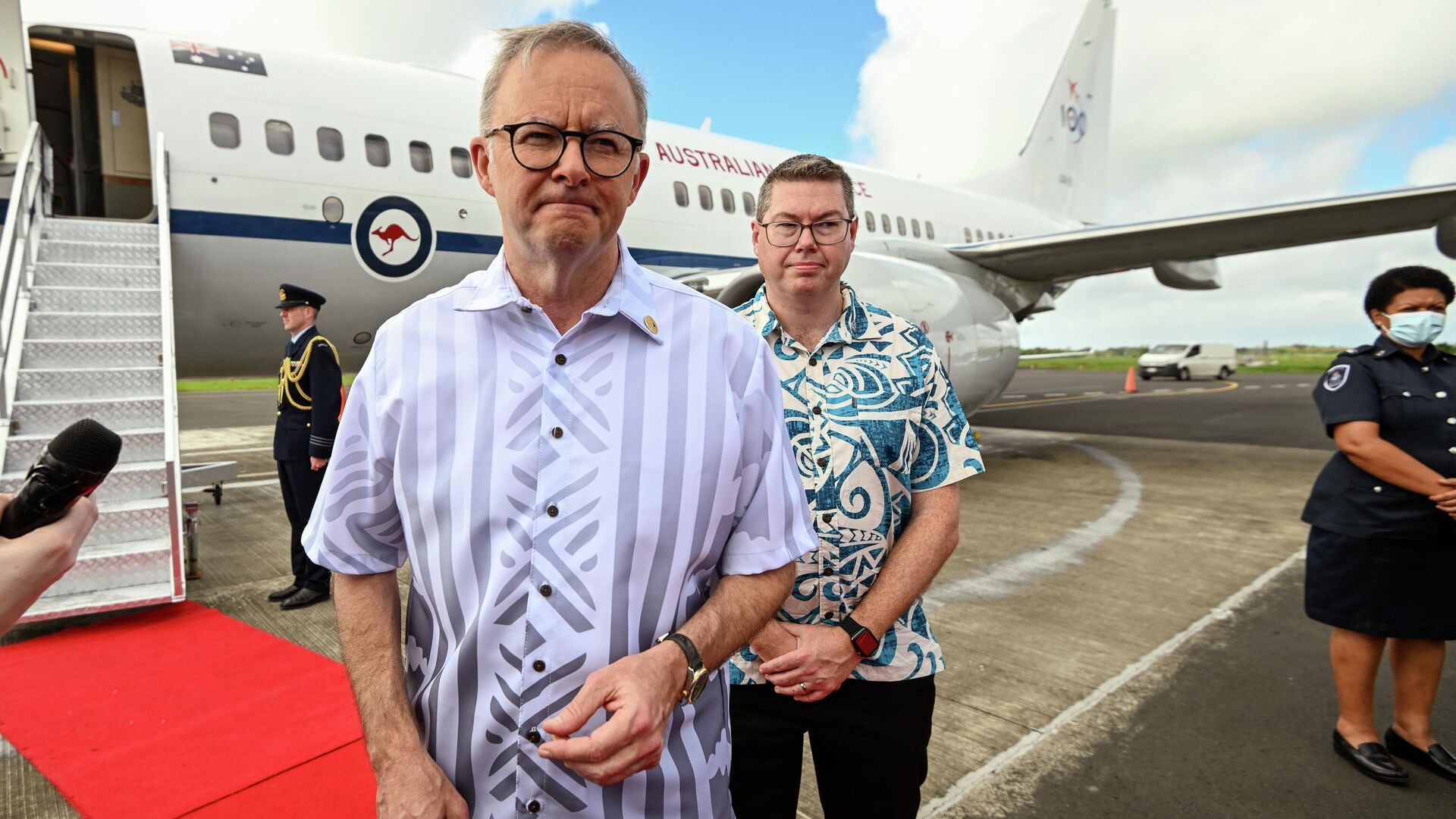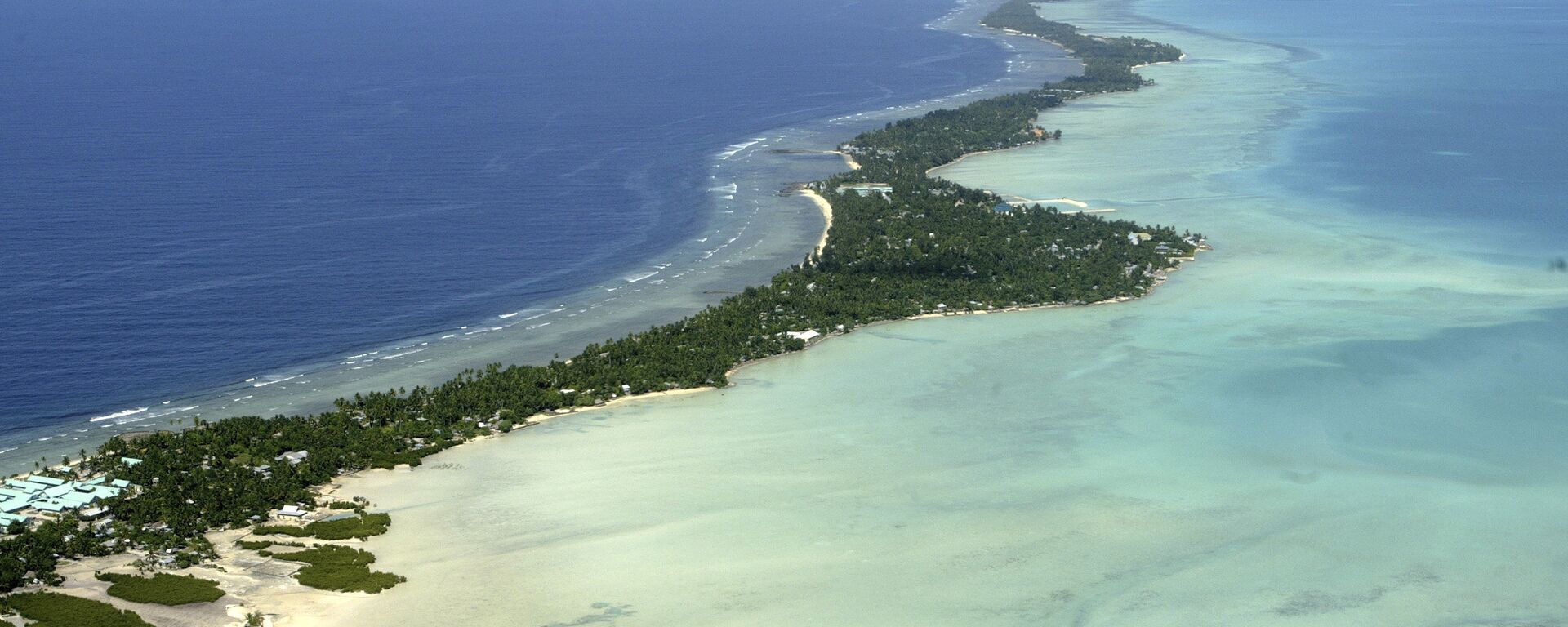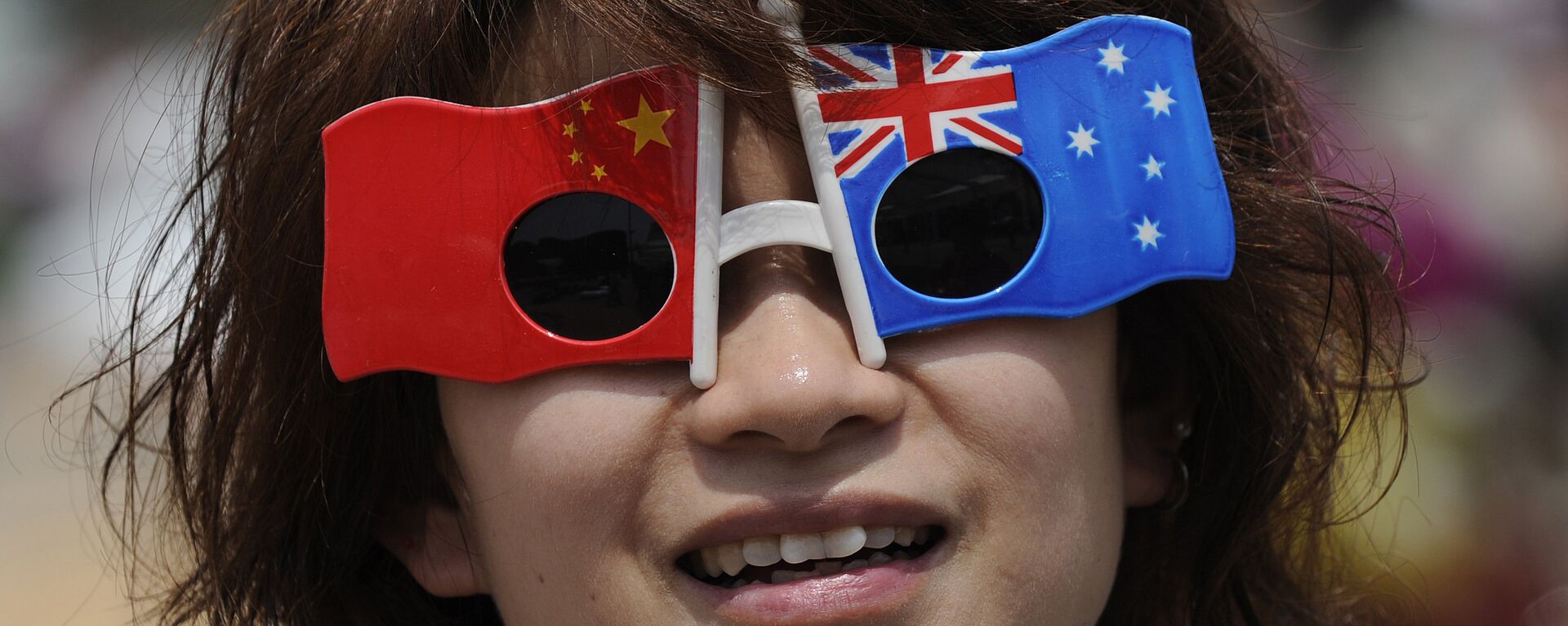https://sputnikglobe.com/20220713/australia-welcomes-renewed-commitment-from-us-towards-pacific-willing-to-work-with-china-1097260296.html
Australia Welcomes 'Renewed Commitment' From US Towards Pacific, Willing to Work With China
Australia Welcomes 'Renewed Commitment' From US Towards Pacific, Willing to Work With China
Sputnik International
US Vice President Kamala Harris took a veiled swipe at China during her virtual address to the Pacific Islands Forum (PIF) meeting in Suva, stating that "bad... 13.07.2022, Sputnik International
2022-07-13T11:38+0000
2022-07-13T11:38+0000
2022-10-19T18:35+0000
australia
china
us
new zealand
pacific islands
asia
https://cdn1.img.sputnikglobe.com/img/07e6/07/0d/1097268157_0:0:3071:1728_1920x0_80_0_0_6c2fa41e67759d300d7add6fdaa1d4ea.jpg
Australian Prime Minister Anthony Albanese has welcomed the "renewed commitment" from the US towards the Pacific Island Nations (PINs) after Vice President Kamala Harris announced new embassies in Kiribati and Tonga, as well as tripling annual developmental aid to $60 million, among a slew of initiatives. Harris said the initiatives were aimed at strengthening Washington’s role in the region.The Australian delegation to Suva comprised Albanese, Foreign Minister Penny Wong and Pat Conroy, Minister for International Development and the Pacific.Since coming to power, the Albanese government has vowed to step up its development aid commitment to the region by $525 million and announced a regional Defense Academy to train personnel in Pacific nations.“We discussed at that forum the need to re-engage with the Pacific, we do have an era of strategic competition within the region,” the Australian PM remarked.“We saw that with the agreement earlier this year between the Solomons and China, and we want to make sure that our Pacific Island friends understand that we want to remain the security partner of choice and also we want to engage with them. We have a common interest,” Albanese added.The PIF is an intergovernmental grouping of 18 Pacific island nations (PINs), including Australia and New Zealand. The forum describes itself as the region’s “premier political and economic policy organization.” This year’s meeting comes against the backdrop of Beijing’s increasing economic and diplomatic footprint in the region, which otherwise has traditionally been in the US, Australia, and New Zealand's sphere of influence.Kiribati, a PIF member, pulled out of the bloc ahead of the key regional meeting after being unhappy over the extension of tenure of the secretary general, as per a leaked letter. Some observers, however, believe that Kiribati’s snub to the PIF is a sign that it backs a bigger role of Beijing in regional affairs.Of the 18 PIF states, the leaders of four island nations — Kiribati, Nauru, Cook Islands, Marshall Islands — weren’t present at this year’s meeting.The US and its ANZUS and Five Eyes Alliance (FVEY) treaty allies Australia and New Zealand have viewed Beijing’s role in the region with mistrust, especially after the unveiling of the Sino-Solomon security cooperation agreement in April.Willing to 'Partner' With Chinese Companies in the Pacific, Australian Minister SaysMeanwhile, Australia’s Minister for International Development and the Pacific Pat Conroy told Fairfax Media in an interview that Canberra was also “open to partnering” with other nations in developmental projects in the South Pacific region.Conroy, however, cautioned that the projects that Australian companies decide to collaborate on with foreign companies must be up to scratch. He said that there were “real sensitivities” that the projects chosen at “cheapest price” were “delivering poor quality outcomes.”“And then secondly, that there isn’t enough focus on including local labor in these projects,” he said.Last month, Chinese Foreign Minister Wang Yi suggested that Beijing was open to carrying out trilateral and quadrilateral projects with Australia and New Zealand in the Pacific region to achieve “win-win outcomes.”The point was reiterated in Wang’s meeting with Australian Foreign Minister Penny Wong on the sidelines of the G20 meeting in Bali this month, the first bilateral engagement between the foreign ministers of the two major trading partners in around three years.Albanese described the meeting as a “constructive” engagement and a “step forward” in repairing the fraught ties between the two countries.
https://sputnikglobe.com/20220711/team-china-pacific-nations-start-snubbing-us-allies-as-kiribati-quits-key-bloc-1097181420.html
https://sputnikglobe.com/20220711/anthony-albanese-ignores-beijings-proposals-aimed-to-get-australia-china-ties-back-on-track-1097177188.html
australia
china
new zealand
Sputnik International
feedback@sputniknews.com
+74956456601
MIA „Rossiya Segodnya“
2022
News
en_EN
Sputnik International
feedback@sputniknews.com
+74956456601
MIA „Rossiya Segodnya“
Sputnik International
feedback@sputniknews.com
+74956456601
MIA „Rossiya Segodnya“
australia, china, us, new zealand, pacific islands
australia, china, us, new zealand, pacific islands
Australia Welcomes 'Renewed Commitment' From US Towards Pacific, Willing to Work With China
11:38 GMT 13.07.2022 (Updated: 18:35 GMT 19.10.2022) US Vice President Kamala Harris took a veiled swipe at China during her virtual address to the Pacific Islands Forum (PIF) meeting in Suva, stating that "bad actors" are trying to "undermine rules-based order." China, on the other hand, says that the US is the "real security threat" to the South Pacific for inciting an arms race in the region.
Australian Prime Minister Anthony Albanese has welcomed the "renewed commitment" from the US towards the Pacific Island Nations (PINs) after Vice President Kamala Harris announced new embassies in Kiribati and Tonga, as well as tripling annual developmental aid to $60 million, among a slew of initiatives.
Harris said the initiatives were aimed at strengthening Washington’s role in the region.
"The United States is an important partner of the region. Australia welcomes their renewed commitment,” Albanese said on Wednesday, after his arrival in the Fijian capital Suva to attend the Pacific Islands’ Forum (PIF) Leaders' Meeting, which kicked off on July 11 and concludes on July 14.
The Australian delegation to Suva comprised Albanese, Foreign Minister Penny Wong and Pat Conroy, Minister for International Development and the Pacific.
Albanese said that the Biden administration’s increased engagement in the South Pacific was in lockstep with the stepping up of Canberra’s involvement in the region since the federal election in May.
Since coming to power, the Albanese government has vowed to step up its development aid commitment to the region by $525 million and announced a regional Defense Academy to train personnel in Pacific nations.
In an interview with the Australian Broadcasting Corporation (ABC) before the presser in Suva, Albanese said that the need to “re-engage” with the region was also discussed during the Quad Leaders’ Meeting in Tokyo in May.
“We discussed at that forum the need to re-engage with the Pacific, we do have an era of strategic competition within the region,” the Australian PM remarked.
“We saw that with the agreement earlier this year between the Solomons and China, and we want to make sure that our Pacific Island friends understand that we want to remain the security partner of choice and also we want to engage with them. We have a common interest,” Albanese added.
The PIF is an intergovernmental grouping of 18 Pacific island nations (PINs), including Australia and New Zealand.
The forum describes itself as the region’s “premier political and economic policy organization.”
This year’s meeting comes against the backdrop of Beijing’s increasing economic and diplomatic footprint in the region, which otherwise has traditionally been in the US, Australia, and New Zealand's sphere of influence.
Kiribati, a PIF member, pulled out of the bloc ahead of the key regional meeting after being unhappy over the extension of tenure of the secretary general, as per a leaked letter.
Some observers, however, believe that Kiribati’s snub to the PIF is a sign that it backs a bigger role of Beijing in regional affairs.
Of the 18 PIF states, the leaders of four island nations — Kiribati, Nauru, Cook Islands, Marshall Islands — weren’t present at this year’s meeting.
The US and its ANZUS and Five Eyes Alliance (FVEY) treaty allies Australia and New Zealand have viewed Beijing’s role in the region with mistrust, especially after the unveiling of the Sino-Solomon security cooperation agreement in April.
Willing to 'Partner' With Chinese Companies in the Pacific, Australian Minister Says
Meanwhile, Australia’s Minister for International Development and the Pacific Pat Conroy told Fairfax Media in an interview that Canberra was also “open to partnering” with other nations in developmental projects in the South Pacific region.
“We partner, for example, in projects that go through the Asian Development Bank that might involve Australian finance, mixing with other people’s finance, developed by the Asian Development Bank and built by a Chinese company,” said Conroy, who is also in the Fijian capital for the PIF meeting.
Conroy, however, cautioned that the projects that Australian companies decide to collaborate on with foreign companies must be up to scratch.
He said that there were “real sensitivities” that the projects chosen at “cheapest price” were “delivering poor quality outcomes.”
“And then secondly, that there isn’t enough focus on including local labor in these projects,” he said.
“They’re two criticisms that are particularly heard of Chinese projects,” Conroy added.
Last month, Chinese Foreign Minister
Wang Yi suggested that Beijing was open to carrying out trilateral and quadrilateral projects with Australia and New Zealand in the Pacific region to achieve “win-win outcomes.”
The point was reiterated in Wang’s meeting with Australian Foreign Minister Penny Wong on the sidelines of the G20 meeting in Bali this month, the first bilateral engagement between the foreign ministers of the two major trading partners in around three years.
Albanese described the meeting as a “
constructive” engagement and a “step forward” in repairing the fraught ties between the two countries.




